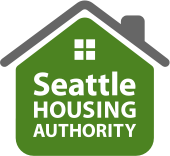SEATTLE—September 27, 2004—Helping residents from our own housing communities is a high priority for the Seattle Housing Authority. By working with local business owners and with the construction contractors on the Seattle Housing redevelopment sites, the housing authority has assisted more than 200 low-income residents in obtaining jobs over the past four years.
Of Seattle Housing's current work force, which exceeds 550, approximately one-third are Seattle Housing Authority residents.
The agency has put a particular emphasis on working in concert with the construction contractors and their subcontractors to ensure employment opportunities are provided to residents. Specifically, the HOPE VI projects that are rebuilding the major Seattle Housing family communities—New Holly, Rainier Vista and High Point—have created significant new economic activity and opportunity for new jobs. Walsh Construction, the general contractor for NewHolly Phases II and III, and its subcontractors have hired 32 low-income residents for the project since 2000.
At High Point, the general contractor, Absher Construction, and its subcontractors have placed 35 low-income residents in redevelopment positions since 2001.
To assist residents toward self-sufficiency, Seattle Housing operates three employment programs, Jobs Plus at Rainier Vista, The Job Connection at Yesler Terrace and High Point, and the Career Development Center at NewHolly, where Seattle Housing partners with Refugee Women’s Alliance (ReWA) and Neighborhood House. In 2003 alone, Seattle Housing’s career development programs placed 132 people in jobs.
Seattle Housing has created a series of steps designed to provide job opportunities to its residents. SHA job counselors work directly with potential employers, like Walsh Construction and Absher Construction, to identity and hire eligible residents.
Rickie Robinson was hired by Seattle Housing to coordinate this resident employment program. Robinson develops working relationships with community colleges, advocates, unions, contractors and other qualified employers to encourage and develop employment, as well as training opportunities for residents. He also maintains employment data required by the Department of Housing and Urban Development (HUD) and monitors the progress of qualified applicants.
HUD requires that wherever they give funding for housing and community development, to the greatest extent feasible, economic opportunities will be given to residents and businesses in that area.
Robinson has worked with partners to provide an apprenticeship job fair that provided information on how to complete the necessary steps to enter an apprenticeship program and co-sponsored trainings to help applicants meet minimum requirements for employment.
